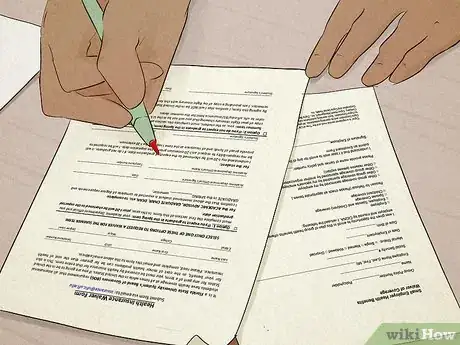This article was co-authored by Lauren Krasny. Lauren Krasny is a Leadership and Executive Coach and the Founder of Reignite Coaching, her professional and personal coaching service based in the San Francisco Bay Area. She also currently coaches for the LEAD Program at Stanford University Graduate School of Business and is a former Digital Health Coach for Omada Health and Modern Health. Lauren received her coaching training from the Coach Training Institute (CTI). She holds a BA in Psychology from the University of Michigan.
wikiHow marks an article as reader-approved once it receives enough positive feedback. This article received 13 testimonials and 100% of readers who voted found it helpful, earning it our reader-approved status.
This article has been viewed 108,851 times.
Starting a new job can be nerve-wracking. You have new tasks to learn and people to meet. How you behave at a new job influences how others will treat you in the future. A smile and positive attitude will go a long way. Treat others with respect and they will return the favor. With a few tweaks to your behavior you'll be a model employee in no time.
Steps
Being Successful Your First Day
-
1Prepare for your first day at work. Starting on the right foot is essential.[1] People will form lasting impressions of you as early as the first day. You want to do your homework and make ample preparation. Without preparation, you may run into difficulties and find yourself unnecessarily aggravated or irritable. Being short or snapping at another co-worker is a terrible way to start a relationship.
- Make sure to either bring or ask for a notebook to begin taking notes early in the day. Bringing one from home shows initiative. Don't be the new employee who doesn't write anything down.
-
2Arrive early and ready to work. Plan to be there at least 15 minutes early. Report directly to your boss or human resources contact.
- If you don't know where to go, kindly let another employee know this is your first day and ask them for directions. They had a first day too so they will understand.
Advertisement -
3Turn your cell phone off.[2] Until you know the rules, assume that using your cell phone during business hours is grounds for immediate termination (this assumption is not far from reality). The first day is all about first impressions. Any cell phone interruption signals a lack of professionalism.
-
4Prepare to be civil and cordial.[3] Most of the bad workplace behaviors come from a lack of respect for others. While your co-workers function in a variety of roles at work, they are still people with feelings. Be polite and friendly to build positive working relationships.[4]
- Prepare to avoid joking or discussing race, gender, age, sexual orientation, or religion. These are sensitive issues for most people. Even if you are comfortable discussing these topics, many other people may feel uncomfortable if you discuss them openly.
- Resist the temptation to ask or pry into people's personal lives. If your curiosity is tickled, ask yourself if the answer is work-related? If not, it’s best to not ask.
- Drive carefully in the parking lot and don't be rude to others as you are rushing to clock in or out on time. Even if you are not on the clock, the people you are speeding past and bumping into are still your co-workers.
-
5Introduce yourself to others with a smile. Smile and take time to introduce yourself in the elevator or to colleagues at the desks across from yours. This small step will help you start developing a relationship with co-workers and let them know you're part of the team.
- As you introduce yourself to others, make an effort to remember their names and positions. Write names and positions in your notebook to memorize. If necessary, note memorable physical features or personal characteristics to help you match faces with names. Quickly learning names shows others you value them.[5]
-
6Ask questions as they arise.[6] You will not know how to do everything nor will you understand the processes on the first day. When you run into a problem, ask someone promptly. The first day it is better to ask and verify than to do something wrong. Since it is your first day, you have a license to ask too many questions. Remember to write down the response in your notebook for future reference.
- If someone is going through a procedure too fast for you to write, ask them to slow down. This may seem rude, but they will appreciate it it. If you write everything down properly, they won't have to repeat themselves later.
- When you've finished a set of instructions, repeat the process back to your instructor. This gives them a chance to ensure you have documented the process properly. They may also emphasize certain points you will want to highlight.
-
7Follow directions closely and precisely. You may know how to do something already, but follow their directions first. Ask before deviating from their process. There may be critical and clear reasons why their methods are different.
- ISO-9001 and other standards have strict rules you may not anticipate. Using a pencil, white-out, or a colored ink pen could land you in hot water with your boss. Even benign changes to procedures can negatively impact your performance.
- If you are given a computer, do not attempt to view webpages or download files without permission. This includes checking your personal email or downloading backgrounds. This may seem benign but may cause you to get in trouble with the computer services department.
Finishing the First Month
-
1Review and expand your notes continuously. After the first day you are expected to remember what you've been repeatedly told. Anytime you have an issue, review your notebook first. Asking for directions only if necessary. This helps show you are capable of working independently. The sooner you can show this, the more respect you will earn from your co-workers.
-
2Demonstrate consistently appropriate work behavior. Continue to show up to work early, dressed appropriate, and ready to work. The first month people develop clear expectations about you. This will influence how they treat you as a co-worker.
- If you are late or make a business dress faux pas, take responsibility for your mistake. Traffic may have been bad, but you could have accounted for it. Making excuses for your temporary lack of etiquette show immaturity.
-
3Read all employment information. Anything your boss or human resources department hands you to read over, do so promptly. Ask questions where you do not understand. Make notes of any rules you think will be difficult to remember or that you think you might break accidentally.
- For example, at most jobs, discussing pay is considered "unethical" and may be grounds for termination. Discussing politics and religion may also get you in trouble even if you do so off-the-clock.
-
4Complete any forms promptly. Many forms must be completed within the first week or month of employment. These include tax and health insurance enrollment forms such as a W-2. You may need to ask your human resources contact how to appropriately fill out these forms.
-
5Memorize people's names and relationships.[7] Beyond just your boss and co-workers, you need to learn the names and relationships of people throughout the company. People who you will meet face-to-face and department heads are particularly important.
- If you are feeling overwhelmed learning people's names and positions, trying drawing a diagram of each department with the department head at the top and everyone under them below. As you learn people's positions, you can write them down and orient them vertically according to their role.
-
6Stay confident and relax.[8] It's a new job and there's a lot to learn, but don't let it intimidate you. Remember you earned that job due to your experience and let your workplace attitude display that confidence and experience. If you get frustrated or overwhelmed, take a deep breath and try again. Let your new bosses see that you work well in new situations and under pressure.
- No matter how many notes you write you will still mess up. When corrected, say "thank you" and look over your notes for errors. Do not blame another co-worker even if you believe their instructions were incomplete. Review your updated instructions with the person correcting you.
-
7
-
8Stay in business mode. Whether you are at lunch with a co-worker or at home posting on social media, you shouldn't relax too much. Whenever work is involved, stay in a professional mindset. Subtle or abrupt changes to your level of professional courtesy may be construed as a lack of respect.
-
9Work as a team player. You're a new employee, but you're part of a team. Ask questions and accept criticism with a smile.
- When you've completed your assigned tasks, ask your manager or superior what you can be doing to help the team. Don't be afraid to ask questions if you're asked to participate in a team or group function. Co-workers will be more likely to help you out and answer your questions if you establish yourself as a team player.
- Engage your new co-workers in conversation when they welcome you to the team, but stay neutral in your opinions about them. You're just as likely to get welcomed into the office fantasy football pool as you are to get targeted by the office gossip, so remain objective until you know whose welcome is genuine.
- Do not be quick to complain about your work even if asked what you do not like about the job so far. Focus on how you can improve your own job performance.[11]
Expert Q&A
-
QuestionIs it normal to struggle in a new job?
 Lauren KrasnyLauren Krasny is a Leadership and Executive Coach and the Founder of Reignite Coaching, her professional and personal coaching service based in the San Francisco Bay Area. She also currently coaches for the LEAD Program at Stanford University Graduate School of Business and is a former Digital Health Coach for Omada Health and Modern Health. Lauren received her coaching training from the Coach Training Institute (CTI). She holds a BA in Psychology from the University of Michigan.
Lauren KrasnyLauren Krasny is a Leadership and Executive Coach and the Founder of Reignite Coaching, her professional and personal coaching service based in the San Francisco Bay Area. She also currently coaches for the LEAD Program at Stanford University Graduate School of Business and is a former Digital Health Coach for Omada Health and Modern Health. Lauren received her coaching training from the Coach Training Institute (CTI). She holds a BA in Psychology from the University of Michigan.
Executive, Strategic, & Personal Coach This is pretty common, and it's nothing to worry about. It takes time to adjust to new responsibilities and learn a company's culture. If you find yourself struggling to complete your work though, you may need to talk to your boss or a coworker to establish some coping skills to catch up on what you need to get done.
This is pretty common, and it's nothing to worry about. It takes time to adjust to new responsibilities and learn a company's culture. If you find yourself struggling to complete your work though, you may need to talk to your boss or a coworker to establish some coping skills to catch up on what you need to get done. -
QuestionHow do you create a positive first impression at work?
 Lauren KrasnyLauren Krasny is a Leadership and Executive Coach and the Founder of Reignite Coaching, her professional and personal coaching service based in the San Francisco Bay Area. She also currently coaches for the LEAD Program at Stanford University Graduate School of Business and is a former Digital Health Coach for Omada Health and Modern Health. Lauren received her coaching training from the Coach Training Institute (CTI). She holds a BA in Psychology from the University of Michigan.
Lauren KrasnyLauren Krasny is a Leadership and Executive Coach and the Founder of Reignite Coaching, her professional and personal coaching service based in the San Francisco Bay Area. She also currently coaches for the LEAD Program at Stanford University Graduate School of Business and is a former Digital Health Coach for Omada Health and Modern Health. Lauren received her coaching training from the Coach Training Institute (CTI). She holds a BA in Psychology from the University of Michigan.
Executive, Strategic, & Personal Coach Be friendly to your new coworkers and treat them with respect. These actions are simple, but they'll help you build positive relationships.
Be friendly to your new coworkers and treat them with respect. These actions are simple, but they'll help you build positive relationships.
References
- ↑ http://www.businessnewsdaily.com/8103-prep-for-new-job.html
- ↑ http://career-advice.monster.com/in-the-office/workplace-issues/the-terrible-10-behaviors-in-the-workplace-hot-jobs/article.aspx
- ↑ http://career-advice.monster.com/in-the-office/workplace-issues/the-terrible-10-behaviors-in-the-workplace-hot-jobs/article.aspx
- ↑ Lauren Krasny. Executive, Strategic, & Personal Coach. Expert Interview. 27 March 2020.
- ↑ Carnegie, D, (1936),"How to Win Friends and Influence People",ISBN 1-4391-6734-6
- ↑ http://www.businessinsider.com/what-to-do-your-first-day-of-work-2014-2
- ↑ http://www.businessinsider.com/what-to-do-your-first-day-of-work-2014-2
- ↑ http://www.businessnewsdaily.com/8103-prep-for-new-job.html
- ↑ http://www.businessinsider.com/what-to-do-your-first-day-of-work-2014-2















































































